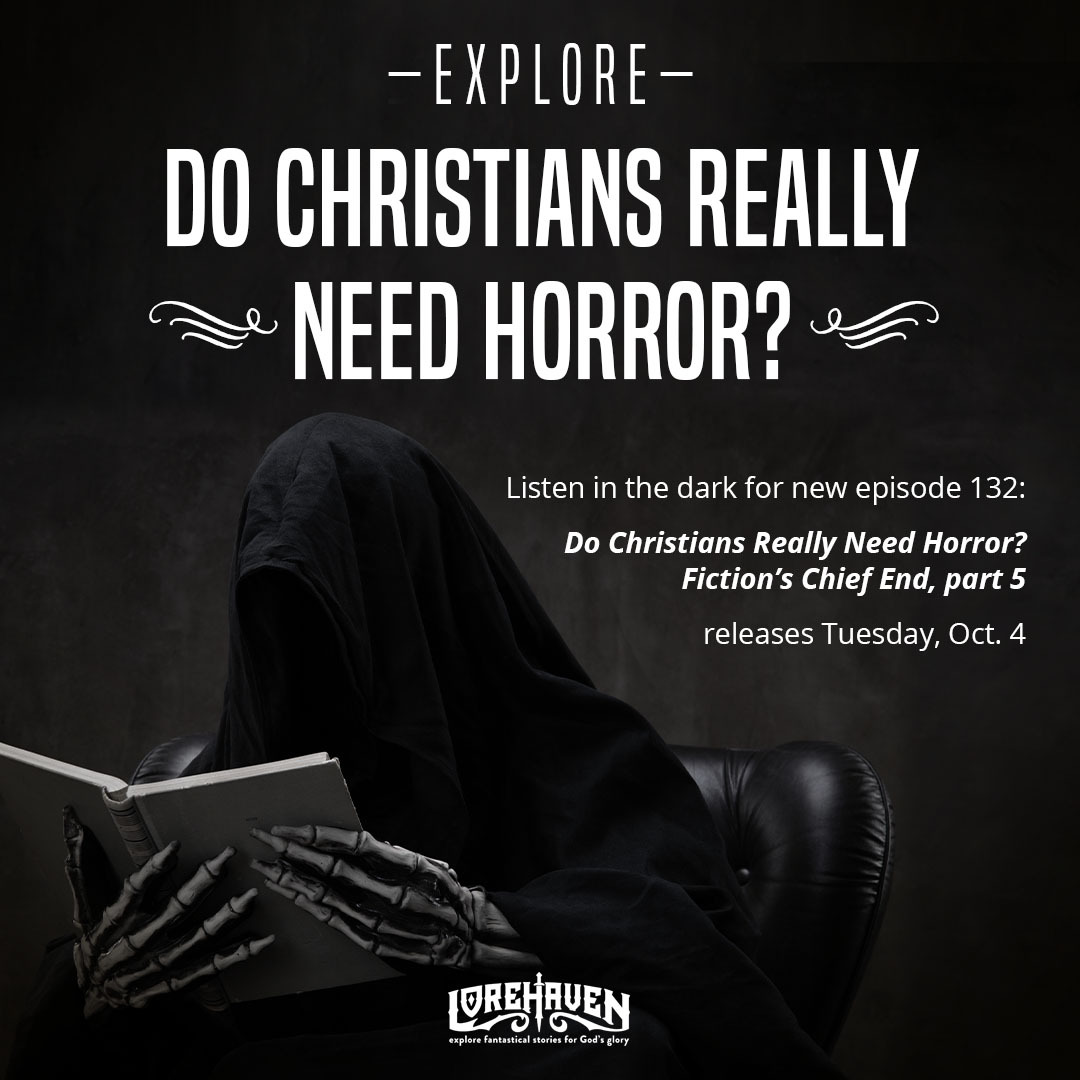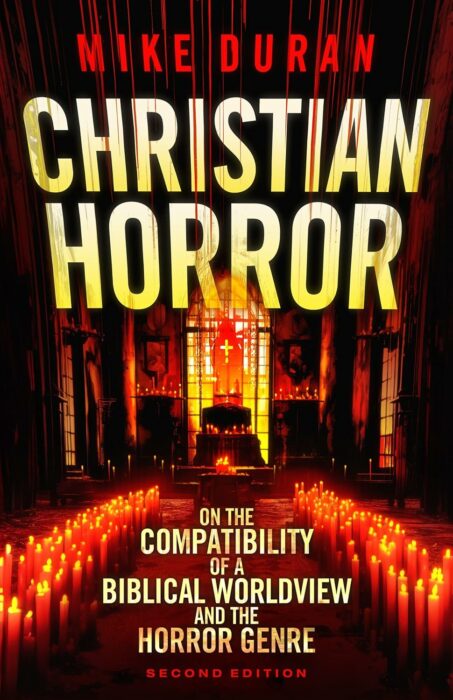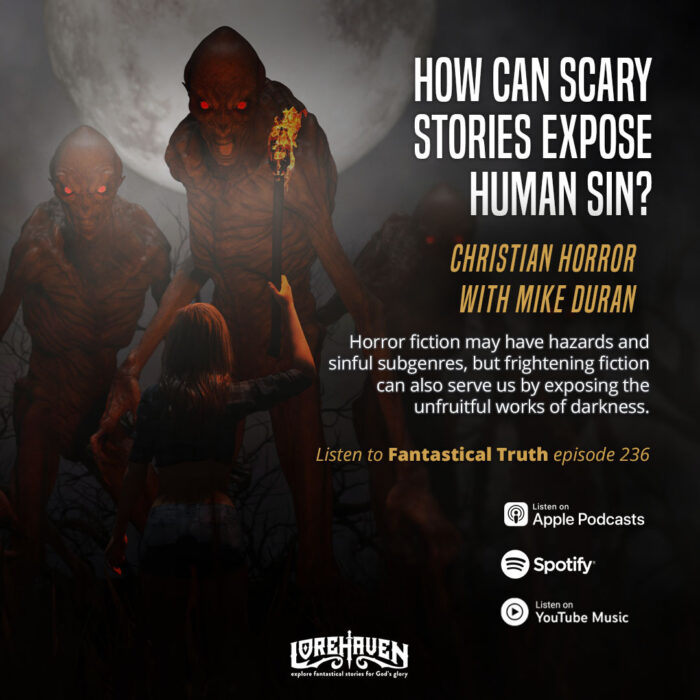236. How Can Scary Stories Expose Human Sin? | Christian Horror with Mike Duran
Podcast: Play in new window | Download (Duration: 1:16:42 — 71.6MB) | Embed
What’s the red-headed stepchild of Christian-made fiction? If you said science fiction, you’re partly right. But here’s a happy prediction: this other wandering genre is probably getting adopted! That might leave outside the other orphaned books—in the genre called horror. Is this one genre above others doomed to be rejected? Mike Duran, author of the nonfiction book Christian Horror, returns to challenge our preconceptions of spooky stories.
Special note: Share this podcast episode before Nov. 5 for a chance to win your free autographed copy of Christian Horror. Use the hashtag #ChristianHorror when you tag Lorehaven on Facebook, on Instagram, or on TwitterX.
Episode sponsors
- Sky Turtle Nova: Rift by Steven James
- DreadKing by David Liberto
- The Jabin Kainos series by Vince Mancuso
Mission update
- Lorehaven Onscreen: ‘The Deliverance’ Shows Christ’s Power to Cast Out Evil and Reunite Families by Parker J. Cole
- Subscribe free to get updates and join the Lorehaven Guild

This previous podcast episode explores the purpose of healthier horror fiction.
Quotes and notes on Christian-made scary stories
Search all Lorehaven for episodes, articles, and books labeled horror
- 39. How Might Bram Stoker’s Novel ‘Dracula’ Cast Light Against Modern Vampires? | with Geoffrey Reiter
- Don’t Let Halloween Flippancy Distract You From Real Horrors and Promises
- Find Light in Darkness With These Six Christian Paranormal Thrillers
- 132. Do Christians Really Need Horror? | Fiction’s Chief End, part 5
- 133. How Are New Fans Discovering the Horror and Holiness of ‘Dracula’?
- 184. How Can Nobledark Horror Explore the Problem of Evil? | with Marc Schooley
- 185. What Are the Scariest Ghost Stories in Scripture?
- 186. Does the Devil Deceive People into Real Witchcraft? | with Marian Jacobs
- How The Crucifix Shows Christ’s Salvation in Dark Fantastical Stories
Concession stand
- This may be your first time, yet we’ve often explored horror at Lorehaven.
- Some may view horror as a “stumbling block”; that’s a legit objection.
- Yet others find comfort in seeing a story that shows sin’s darkness.
- Scripture itself shows people rejoicing in God’s law that exposes evil.
- Today, many people need to believe Satan exists before they find Christ.
- That is just what the best horror tales, old and new, are designed to do.
 Introducing guest Mike Duran
Introducing guest Mike Duran
Mike Duran is a novelist, artist, and freelance writer. Mike writes fiction and non-fiction. His newest release is Keeper of the Woods (2024); he also wrote The Ghost Box (2014), which was selected by Publishers Weekly as one of the best 2015 indie novels—first in a paranoir series that continues with Saint Death (2016), and The Third Golem (2020). His nonfiction books Christians and Conspiracy Theories (2023) and Christian Horror (second edition, 2023) apply biblical truth to these fantastical topics.
1. How do Christians avoid confronting real horror?
- Well-meaning Christians use “clean” or “family” fiction to cover over sins.
- When people are evil, we assume it’s because they were treated badly.
- We excuse supposed “acceptable” sins in our lives, churches, cultures.
- If our leaders sin, we claim it’s necessary for the greater good/the world.
- Or we may intentionally listen to deceptions of the world/Satan/flesh.
- Finally, we just ignore all of it; we get out our phones and play games.
2. Why might we wrongly obsess on horror images?
- Stephen saw an expensive lawn full of horror-for-its-own sake images.
- These weren’t warnings, or part of a story. There was no other context.
- It’s a sort of flippancy that tries to laugh at death, an unearned “victory.”
- This is the kind of purposeless horror that Christians rightly critique.
- Now a lot of people, overcorrecting for the “clean” stuff, may praise this.
- In some cases, they have likely gone from the frying pan into the fire.

Share this podcast episode before Nov. 5 for a chance to win your free autographed copy of Christian Horror. Use the hashtag #ChristianHorror when you tag Lorehaven on Facebook, on Instagram, or on TwitterX.
3. What’s a more biblical view of ‘Christian horror’?
- Scripture itself never assumes someone else will teach the scary parts.
- From the very beginning, a creepy serpents tempts Adam and Eve.
- God passes judgments of mortality, murder, anarchy, and the Flood.
- Later we get hints about Satan’s dark activities behind the scenes.
- Evil spirits get even more active in the days of Jesus’s work on Earth.
- Today, demons and dark spiritual ideas are real; stories must show them.
Com station
What’s your favorite scary story that helps you see sin for what it is?
Sean Truax in the RealmSphere shared thoughts about ep. 233:
So, late with a comment as I listened to this a few days ago, sorry.
This is another excellent episode and it had me questioning some of my own beliefs and how I was raised.
I grew up in a Christian home, mom taught a weekly Good News Club, and both of my parents volunteered quite a bit at Church (Children’s ministry for my mom, adult Sunday School for my dad). My parents are also huge Science Fiction nerds. I have memories of attending a Star Trek convention back in the mid-70s. Heinlein and Azimov books were throughout our house, and they took us to see Star Wars and Empire Strikes Back more times than I can count.
Fantasy was a different story. I know I saw the cartoon of “The Hobbit” in the late 70’s/early 80’s, but that was it. Dungeons & Dragons were forbidden, and that stuck with me into adulthood so much that Fantasy Fiction isn’t my thing. The exception is Tolkien and CS Lewis, we had those books grown up, but nothing else. But D&D? Yeah, I struggle with that one.
I can appreciate those who like to play RPGs (I still have some sci-fi ones), but the whole “avoid the appearance of evil” is very much in my head when I see or hear about Christians playing D&D. I have learned that the “appearance” part is less important than what God is telling you about your hobbies. Are they an idol on your time (or money), or in the case of RPGs, are they a way for you to act in an un-Christian manner simply because it’s make-believe?
I like how you guys broke down the difference between what 1 Thess 5:22 says, and how many have re-interpreted it. From what I said above, yes, I’m a victim of the re-interpretation. I don’t know that I will go out and start bingeing on Christian Fantasy books now, but you’ve given me something to think and pray about.
Next on Fantastical Truth
Hi! Wow. Middle of autumn. I know what you’re thinking about. Christmas! This weekend the new comedy The Best Christmas Pageant Ever! releases in theaters. And five Thanksgiving seasons ago, in Nov. 2019, new fans began watching the second half of a new biblical fiction drama called The Chosen. Next week, we’re thankful to host one of the three Chosen screenwriters who also cowrote The Best Christmas Pageant Ever!, Ryan Swanson.






























I’m a big fan of the book The Best Christmas Pageant Ever by Barbara Robinson so I’m interested in your interview with those screenwriters.
First, a quick confession because Zack opened that door. (And if you’re reading this mom, then I’m sorry you’re hearing about it now.) I too would wander into the horror aisle at Blockbuster and peek at those movies. Feels good to get that off my chest after all these years.
I like scary, suspenseful stories. But like you all and Mike, I’ve never been a fan of the slasher movie subgenre or the use of grotesque, graphic violence for its own sake. Oftentimes, the scariest things are what we don’t see or at least the anticipation of what we COULD see that raises the suspense and our heartrates.
As a Christian, I haven’t minded scary things as long as the story isn’t focused on the gratuitous but rather good triumphing in the face of evil, through the fight and even sadness along the way. We can go to the cross as an example. God didn’t let his own son escape the horrors of death–and then a death in one of the most horrific ways humanity has ever created.
How we tackle it in Christian Horror needs to not shy away from potentially horrific things and entities and always make sure to point to Jesus’s victory and power without being cheesy because, like you say, there needs to be an engaging conflict with a satisfying arc, a character’s journey that we can relate to even if there’s a monster, demon, or even a cult involved. (With the caveat that some people can be more affected emotionally and spiritually by these stories, so they should take caution because, in the end, watching or reading scary stories doesn’t give us a special badge on our faith sash.)
Com Station Answer: My favorite scary story that helps me see sin for what it is is hands down “The Oath,” which y’all just posted a review about. Reading that about twenty years ago left a visual I still think about to this day, how giving in to sin numbs us and blinds us to what a horrible end–however literal or metaphorical–we could meet if we don’t repent and follow Jesus.
I had to leave a comment on this episode because I’ve had “Christian Horror” on my Amazon list for a bit now ever since I discovered Mike Duran not too long ago. I can’t remember how, but it started when I began reading Bryan Timothy Mitchell’s “Infernal Fall,” which maybe the Amazon algorithm put Mike’s book in front of me, then I discovered y’all had Mike on a ye olden episode from four years ago, #36, then right after listening to that, I bought “The Visitant” and liked it a ton. (Though, I’d like to hear his take on using language as a Christian.) I would love an autographed copy of “Christian Horror” because I believe that’s a genre I’d like to write in alongside paranormal and supernatural suspense, and I like what Mike has to say and what I’ve read so far. I look forward to reading more of his work.
To the extent that i am interested in horror (limited), my interest tends more towards stories where the horror is more existential than of demonic or human origin, but for a scary story that involves a Cain and Abel dynamic, there’s the excellent “His Face All Red”, a horror comic by Emily Carroll. There’s a very good dramatic reading of it by ProZD on Youtube as well. It leaves a lot of questions unanswered, but i think that’s what makes it work as a horror story.
Horror was my favorite genre growing up. Supernatural or slasher, I liked it all. For years I ignored the argument that you could become desensitized, but eventually I started to see that it had happened to me…to an extent.
A combination of the death of a classmate, and watching one of the Faces of Death films, showed me that I was too casual about death in general, but also that I wasn’t completely desensitized. When watching a slasher film I knew that the whole thing was fake, so I wasn’t bothered by it. When I saw a story about death in the news, I didn’t think of it as fake, but I also didn’t have much in the way of compassion because they weren’t people I knew, and I hadn’t seen their horrible deaths. But with the death of a classmate, and seeing the gruesome deaths of others, it was like I had been woken up by a cold bucket of water and a punch to the gut. Compassion was awakened in me. And as I come to know Jesus better, that compassion grows.
I don’t have the same love of horror stories that I used to, but I still enjoy them from time to time. And one thing I’ve wanted to do for a while is to try and understand what I like about horror. Some of the enjoyment I had for horror movies as a kid came from more sinful desires, but what about now? God is changing me in this area but I haven’t really stopped and analyzed those changes. Discussions like this are helping me to think deeper. I’m working my way through all of your episodes (I’m up to #145), but I’m glad I jumped ahead to listen to this one.
Zach made an interesting comment in this episode- that one problem with the horror genre is often the message that we can overcome the monster by our own strength, and not through God.
I’ve often had the same thought as it regards to magical world building. Don’t get me wrong- I’m not hating- as a kid I was thrilled by the idea of Superman’s powers, by the idea of untapped innate human powers in Heinlein’s Stranger and a Strange Land, as an adult by Brandon Sanderson’s magic systems in the Mistborn and Stormlight sagas. And I still enjoy reading books of that kind. But there is a bit of unhealthy “I will, my way, my strength” wish fulfillment in that.
I’m not necessarily saying there is a problem with stories of this kind . . . but I do have a nagging suspicion that perhaps, as Christians, we should be doing better. In all the cases I listed above, and in all I can think of the top of my head, the “Powers” in all of these magic systems are internal, innate, coming from the “self” of the protagonist- or to phrase it as Zach did- the hero is overcoming the “monster” by his own strength- in this case a magical ability.
In one of the Biblical stories which represent similar “superpowers”, we are clearly shown that Sampson’s powers, though quite “super”, are also clearly from God, meant to be wielded for His purposes and His glory, and are not of Sampson’s own strength or even under his own control.
I wish there were more fantastical stories illustrating this very real magical system employed by our Creator- and to add to that wish list, answering the question you asked in episode 234 Future Voices (what would we like to see more of?)- more complex stories written for the adult market, and written with men in mind. There’s a lot of great YA, plenty of stories written by and for women, but there’s a great mass of adult men out here, and some of us are feeling a bit left out.
The resultant frustration was one of the impetuses which launched my own writing career. Hoping to see many more, like me, working to advance the Kingdom by writing great Christian Fantastical Tales for guys like me!